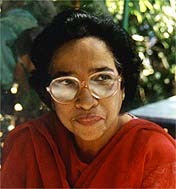An
unusual Valentine’s Day card caught my attention in a book shop. It had a dried
peepal leaf stuck on the outside, with the face of a beautiful woman painted on
it. Two beauty spots were seen on her left cheek. Inside the card were these words:-
“I am an expert in things of love. Even the moth is
my disciple.”
The author of these lines was ‘Makhfi.’
“Who is this poet?” I wondered, “Is it man or a
woman?”
So began my search for Makhfi – the ‘Invisible One.’
Though
the women of the Moghul Empire were mostly ignored, Zebunissa the eldest daughter
of Emperor Aurangzeb was an exception. She was renowned in the Literary World
as a sensitive Sufi poet.
Born
in 1638 to Aurangzeb and Debias Banoo, a descendant of the Persian Safavid
dynasty, Zebunissa was the Emperor’s favourite child for the first half of her
life. He ensured that she received a good education in science, maths,
astrology, philosophy, literature and languages like Persian, Arabic and Urdu.
She memorized the entire Quran within three years, and by the age of seven, was
declared a Hafiz. Her father was so thrilled by her performance that he turned
it into a big celebration, and gifted her with 30,000 gold pieces.
Zebunissa
started writing poetry from the age of fourteen. But as her father hated
poetry, she was secretive about it and wrote under the pseudonym Makhfi meaning
the ‘invisible one.’
Zebunissa
was exposed to the affairs of the Moghul Court. The Emperor discussed his
political problems with her and even sought her opinion on various issues. But
she soon became conscious of his unbridled ambition and cruelty, which led to
the dethronement of his father Shah Jehan. She also disliked his orthodox views
on religion and society.
At
the age of 21, her relationship with her father underwent a drastic change. He
became more conservative and strict. He resented her love of poetry and her
desire to become a Sufi poet. But Zebunissa proved to be a rebel. She secretly
participated in literary and cultural events, her face covered with a veil. Her
poems were steeped in mystic thought – of love, freedom, inner experiences of
the soul and love of God. The Persian poet Hafiz Shiraz had an influence on her
poetry. She became one of the members of the Indian School of Poetry in
Persian.
Aurangzeb
was jealous of her talents and rising fame in literary circles. She was moved
to Tees Hazari, a house with an imposing garden, which was once the home of her
talented aunt Jahan Ara. Zebunissa became a patron of poets. Her poems were
appreciated by her contemporaries. She established an excellent library, employing
scholars to translate famous literary works.
Zebunissa
was a tall, slim woman with a glowing complexion. She dressed soberly without
adornments except for a string of pearls. She remained a spinster all her life
though she had a train of lovers and many indiscreet liaisons. Her fondness for
her slave girl Mian Bai was also the subject of gossip. She gifted her with the
Charbuji Gardens in Lahore. The inscription on the gate read “This garden has
been bestowed on Mian Bai by the beauty Zebinda Begum, the lady of her age.”
Zebunissa’s
fame infuriated her father. He decided to humiliate her publicly. He invited a
famous Iranian poet Nazir Ali to his court, to challenge Zebunissa to a
contest. Nazir would begin a couplet
which Zebunissa had to complete in three days. If she failed to do so, she
would have to renounce poetry forever. Zebunissa decided that she would rather
commit suicide instead.
But
she won the contest, and this was the beginning of a love affair between Nazir
and her. It was short lived. Aurangzeb had the man put to death for daring to
love a princess.
Later,
Aurangzeb accused her of conspiring with her brother Akbar, who led a revolt
against him. She was imprisoned in Salimgarh Fort for the next twenty years,
till the end of her life. She continued to immerse herself in literature and
poetry for as long as she lived.
Zebunissa
died in 1702, when the Emperor was away in Deccan. She was buried in “The Garden
of Thirty Thousand Trees,” near the Kabul Gate in Old Delhi. But when a railway
line was laid, her coffin and tombstone was shifted to Akbar’s mausoleum in
Sikandra at Agra.
Zebunissa
was a rare woman. Her poems (5000 verses) were compiled posthumously into a
volume titled Diwan-i-Makhfi. It was later translated from Persian to English
by Willis Barnstone. Copies of it are preserved in the British Museum and the
National Libraries of Paris and Tehran, Library of University of Tubingen, and
Mota Library in Delhi.
As Shelley said, “Poetry makes immortal all that is
best and most beautiful in the world.”
